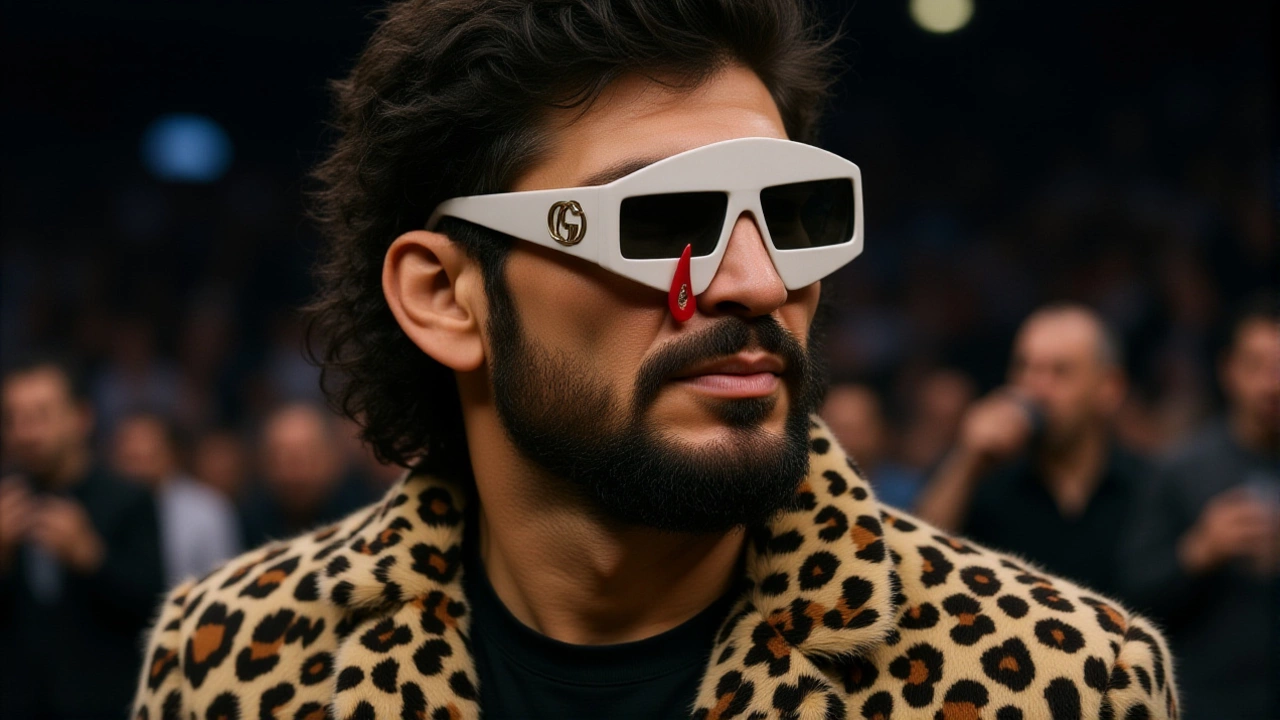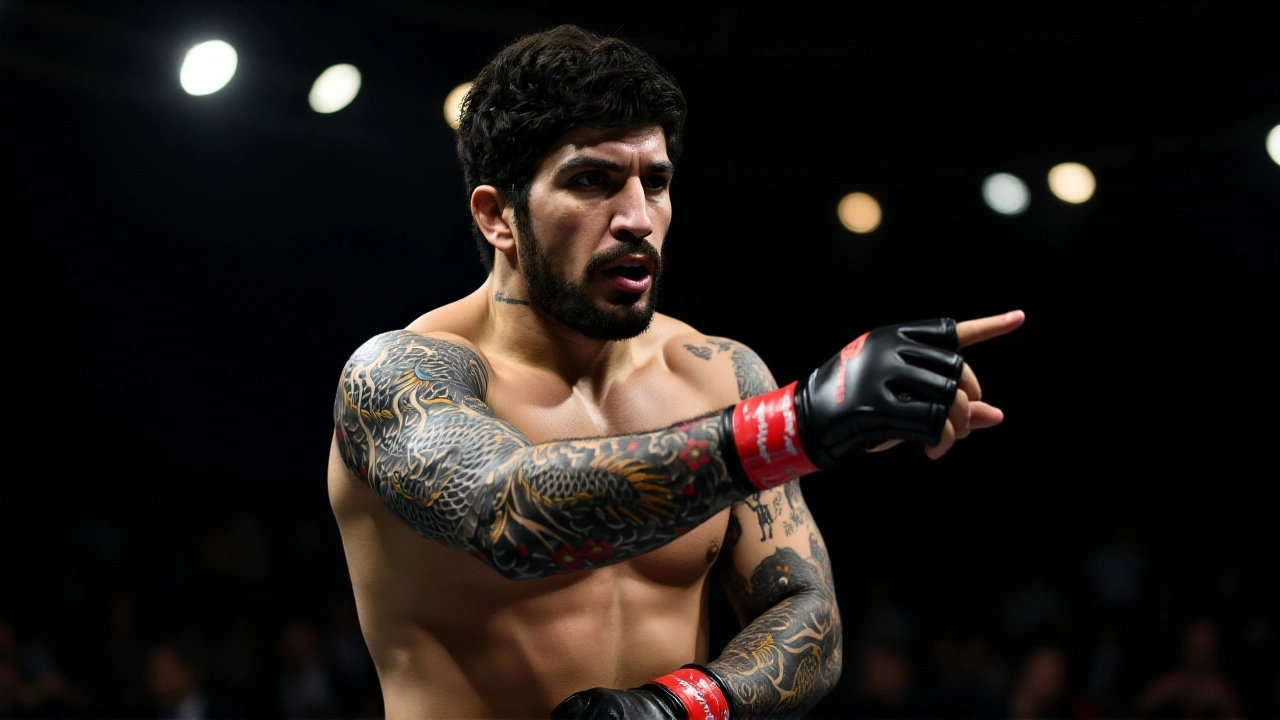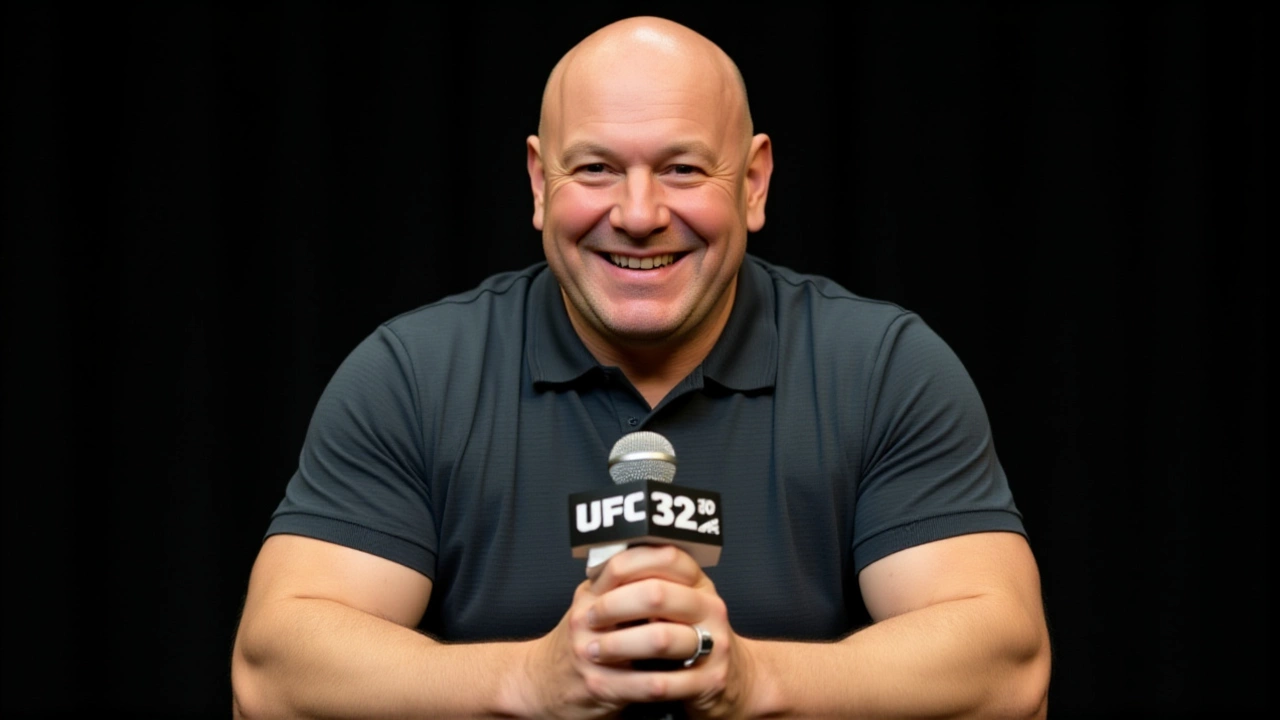When Ultimate Fighting Championship president Dana White stood at the podium after UFC 322T-Mobile Arena on November 16, 2025, he didn’t announce a new signing or a title fight. He announced the end of an era — permanently. Dillon Danis, the 31-year-old Brazilian Jiu-Jitsu specialist and former coach to Khabib Nurmagomedov, was banned for life from all UFC events. No exceptions. No appeals. No second chances. "You’ll never see Dylan Danis at a UFC fight ever again," White said, stumbling over the name — a slip that somehow felt fitting, given how tangled this whole mess had become.
The Brawl That Broke the Cage
It happened just before the main event. Dillon Danis, who’d bought a ticket to UFC 322, wasn’t in his assigned seat. Security spotted him moving through fighter rows near the octagon, visibly agitated, eyes locked on the corner of Islam Makhachev’s team. That’s when things turned ugly. According to White’s own account, security approached him with a simple question: "Do you want us to throw him out?" White’s reply: "He has a ticket." That decision haunted him. Moments later, a physical altercation erupted between Danis and members of Makhachev’s camp — the same group once led by Khabib Nurmagomedov, now managed by his longtime inner circle. Eyewitnesses described shoving, raised fists, and a frantic scramble as arena staff intervened. Danis was ejected before the final bell rang in Makhachev’s 5-round unanimous decision win over Jack Della. No one was arrested. The UFC confirmed it wouldn’t press charges. But the damage? That was irreversible.Why This Wasn’t Just Another Fight Night Incident
This wasn’t a random fan outburst. This was a reckoning. Danis and Khabib were once inseparable. As Khabib’s personal jiu-jitsu coach during his undefeated UFC run, Danis helped shape the Russian champion’s ground game. But after Khabib retired in 2020, the relationship shattered. Public accusations flew. Social media wars erupted. Danis, once a trusted insider, became a pariah in the Nurmagomedov camp. By 2025, he was a walking controversy — a former ally turned provocateur, desperate for relevance in a world that had moved on. His appearance at UFC 322 wasn’t just attendance. It was a statement. And the Nurmagomedov team, still fiercely loyal to their patriarch, wasn’t going to let him walk away unchallenged. What followed wasn’t just a brawl — it was the culmination of five years of simmering tension.White’s Regret and the Weight of Responsibility
"I blame myself for that," White said, voice tight. He didn’t deflect. He didn’t blame security. He didn’t blame Danis’s past. He took it. And in doing so, he sent a message: the UFC’s reputation is non-negotiable. This is the first lifetime ban of a non-fighter in UFC history. Not a fighter who failed a drug test. Not a coach who coached a cheater. A spectator. A man with a ticket. And yet, White knew — if Danis was allowed back, this would happen again. And next time, it might not end with just a shove. "He said you guys don’t want to sign him because he makes too much trouble," White added, almost resigned. "Well, that and a lot of other reasons. Point made." The irony? Danis has been trying to get a UFC contract for years. He’s got the credentials — multiple BJJ world titles, a pro boxing record. But his reputation? That’s a cage he can’t escape.
The Nurmagomedov Camp Demands More
And the fallout didn’t stop with White’s announcement. Islam Makhachev, the reigning lightweight champ and Khabib’s protégé, didn’t just sit back. He called for harsher punishment. "An even bigger Dillon Danis punishment than Dana White’s ban," said Alexander K. Lee of Bloody Elbow, citing Makhachev’s public remarks. Meanwhile, sources linked to Eagle FC, Khabib’s own promotion, reportedly demanded a formal investigation and a public apology — not just from Danis, but from the UFC. "They’re not just mad," one insider told MMA Fighting. "They’re heartbroken. Khabib built something sacred. And now someone who was part of that is tearing it apart in public."What This Means for the UFC’s Future
The UFC has always walked a tightrope between entertainment and integrity. Danis was a walking PR nightmare — loud, polarizing, and unpredictable. But until now, he was just noise. Now, he’s a precedent. This ban sends a clear signal: the UFC will not tolerate chaos inside its own house. Even if you’re not in the octagon, you’re still part of the ecosystem. And if you threaten its stability, you’re out. It also raises questions. Will Danis sue? Will he try to join another promotion? Will he become a commentator on rival platforms? The UFC might have silenced him in their arena, but they can’t silence him everywhere. And then there’s the bigger picture: what happens when a coach turns enemy? What happens when loyalty fractures in the tight-knit world of MMA? This isn’t just about one man. It’s about the cost of ego in a sport built on respect.
What’s Next?
Danis has not made a public statement since his ejection. His social media remains silent. The UFC has not announced any changes to its spectator code of conduct — but insiders say policy reviews are underway. Meanwhile, fans are divided. Some cheer White’s decisiveness. Others call it overreach. One thing’s certain: the UFC will never be the same. The line between fan and foe has been redrawn. And now, everyone knows what happens when you cross it.Frequently Asked Questions
Why did Dana White say 'Dylan Danis' instead of 'Dillon Danis'?
White repeatedly mispronounced Danis’s name during the press conference, saying "Dylan" instead of "Dillon." This wasn’t a typo — it was a verbal slip that occurred multiple times. Experts suggest it may reflect subconscious disassociation — White was so frustrated with the situation that his brain defaulted to a version of the name that felt less real, less connected to the chaos. All major outlets correctly reported the spelling as "Dillon Danis."
Has the UFC ever banned someone for life before?
Never. While fighters have been suspended for PED violations or conduct violations, no non-fighter — not a manager, promoter, or fan — has ever received a lifetime ban from UFC events. This sets a new precedent. Even notorious figures like Tito Ortiz or Conor McGregor, despite their controversies, were never permanently barred from attending. Danis’s ban is unprecedented.
Why didn’t the UFC press charges?
The UFC chose not to press charges to avoid a prolonged legal battle that could draw more attention to the incident. With no serious injuries reported and no video evidence of extreme violence, legal action would’ve been difficult to prove and potentially counterproductive. The ban itself serves as the organization’s primary punishment — and its most effective deterrent.
What role did Khabib Nurmagomedov play in this?
Khabib Nurmagomedov was not present at UFC 322 and has not publicly commented on the incident. However, his influence looms large. Danis was once his personal coach, and the Nurmagomedov camp still operates as a unified unit under Eagle FC. Makhachev’s call for harsher punishment reflects the camp’s collective stance — they see Danis as a betrayal, not just of Khabib, but of their entire legacy.
Can Dillon Danis ever return to the UFC as a coach or commentator?
Under the current ban, no. The restriction applies to "all future UFC events," which includes media appearances, training camps, and behind-the-scenes access. Even if Danis were to apologize, the UFC has shown no indication of reversing the decision. His association with the organization is officially over — and likely forever.
How might this affect future fan behavior at UFC events?
Security protocols are expected to tighten. Fans with known ties to fighters or past controversies may face enhanced screening or be denied entry based on behavioral history. The UFC has quietly begun reviewing attendance records of individuals linked to past incidents. While the organization won’t publicly admit to "blacklists," insiders confirm they’re now more vigilant than ever — especially around high-stakes events.
